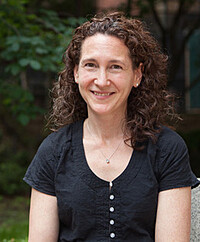On this webinar we heard about two recent intervention studies that investigate day-to-day exposures to two chemical groups of concern, flame retardants and pesticides, and what the findings reveal about implications for policy change.
Anthropogenic flame retardant chemicals are included in a myriad of consumer products to meet the flammability requirements. While one class of flame retardants (PBDEs) were voluntarily phased-out of use due to concerns about health effects, manufacturers have introduced organophosphate flame retardants (OPFRs) and alternative brominated flame retardants (Alt-BFRs). Health effects associated with exposure to these replacement compound classes are of concern but have been less well studied. U.S. EPA guidelines suggest reducing exposure to flame retardants by increased hand washing and house cleaning. In this webinar, Dr. Julie B. Herbstman, Associate Professor in the Department of Environmental Health Sciences and the incoming Director of the Columbia Center for Children's Environmental Health (CCCEH) at Columbia University Mailman School of Public Health, presented the results of a two-week intervention study conducted by the Center to evaluate the effectiveness of these recommendations to reduce exposure to flame retardants.
Over one billion pounds of synthetic pesticides are used in U.S. agriculture annually, and many of the most commonly used pesticides have been associated with harm to human health. Diet accounts for a significant proportion of pesticide exposure in the general population. In this webinar, Dr. Kendra Klein, Senior Staff Scientist at Friends of the Earth, reported on a study conducted by researchers from UC Berkeley, UCSF, Friends of the Earth, and Commonweal Biomonitoring Resources Center that investigated the impact of a six-day organic diet intervention on levels of organophosphates, neonicotinoids, pyrethroids, and 2,4-D in the urine of adults and children in four families across the country. As a next step, Friends of the Earth is working to expand organic farming and access to organic food in the U.S. via their Organic for All campaign (www.OrganicforAll.org).
Featured Speakers
 Julie B. Herbstman, PhD, ScM, is an Associate Professor in the Department of Environmental Health Sciences and the incoming Director of the Columbia Center for Children's Environmental Health (CCCEH) at Columbia University Mailman School of Public Health. Trained as an epidemiologist, Dr. Herbstman’s research focuses on the impact of prenatal and early life exposures to endocrine-disrupting environmental pollutants, including polybrominated diphenyl ethers (PBDE), pyrethroid pesticides, polycyclic aromatic hydrocarbons (PAH), environmental phenols (including BPA), perfluorinated compounds, and phthalates and their impact on child health and neurodevelopment. She has also been involved in research exploring the long-term environmental health impact of exposure to pollutants from the collapse of the World Trade Center on 9/11. She leads multiple longitudinal birth cohorts within the CCCEH. She directs the Center's work involving the integration of epigenetic biomarkers to explore the mechanistic pathway between prenatal exposures and disease risk in childhood and across the lifecourse.
Julie B. Herbstman, PhD, ScM, is an Associate Professor in the Department of Environmental Health Sciences and the incoming Director of the Columbia Center for Children's Environmental Health (CCCEH) at Columbia University Mailman School of Public Health. Trained as an epidemiologist, Dr. Herbstman’s research focuses on the impact of prenatal and early life exposures to endocrine-disrupting environmental pollutants, including polybrominated diphenyl ethers (PBDE), pyrethroid pesticides, polycyclic aromatic hydrocarbons (PAH), environmental phenols (including BPA), perfluorinated compounds, and phthalates and their impact on child health and neurodevelopment. She has also been involved in research exploring the long-term environmental health impact of exposure to pollutants from the collapse of the World Trade Center on 9/11. She leads multiple longitudinal birth cohorts within the CCCEH. She directs the Center's work involving the integration of epigenetic biomarkers to explore the mechanistic pathway between prenatal exposures and disease risk in childhood and across the lifecourse.
 Kendra Klein, PhD, is Senior Staff Scientist at Friends of the Earth where she leads work on food and farming solutions. She is a writer, researcher, and advocate with over seventeen years of experience in environmental sustainability, food, agriculture, and environmental health. Prior to joining FOE, she coordinated farm-to-institution work at the California Healthy Food in Health Care campaign for Health Care Without Harm and worked at Breast Cancer Action on chemical policy reform and corporate accountability related to pink ribbon fundraising. Klein has apprenticed on organic farms in California and Hawaii. She is a 2011 Switzer Environmental Fellow and has written for The Guardian, The Nation, Gastronomica, and Civil Eats. She holds a BA in Interdisciplinary Studies from Miami University of Ohio and a PhD in Environmental Science, Policy & Management from UC Berkeley.
Kendra Klein, PhD, is Senior Staff Scientist at Friends of the Earth where she leads work on food and farming solutions. She is a writer, researcher, and advocate with over seventeen years of experience in environmental sustainability, food, agriculture, and environmental health. Prior to joining FOE, she coordinated farm-to-institution work at the California Healthy Food in Health Care campaign for Health Care Without Harm and worked at Breast Cancer Action on chemical policy reform and corporate accountability related to pink ribbon fundraising. Klein has apprenticed on organic farms in California and Hawaii. She is a 2011 Switzer Environmental Fellow and has written for The Guardian, The Nation, Gastronomica, and Civil Eats. She holds a BA in Interdisciplinary Studies from Miami University of Ohio and a PhD in Environmental Science, Policy & Management from UC Berkeley.
This webinar was moderated by Karen Wang, PhD, Director of CHE.
It lasted for 45 minutes and was recorded for our call and webinar archive.
